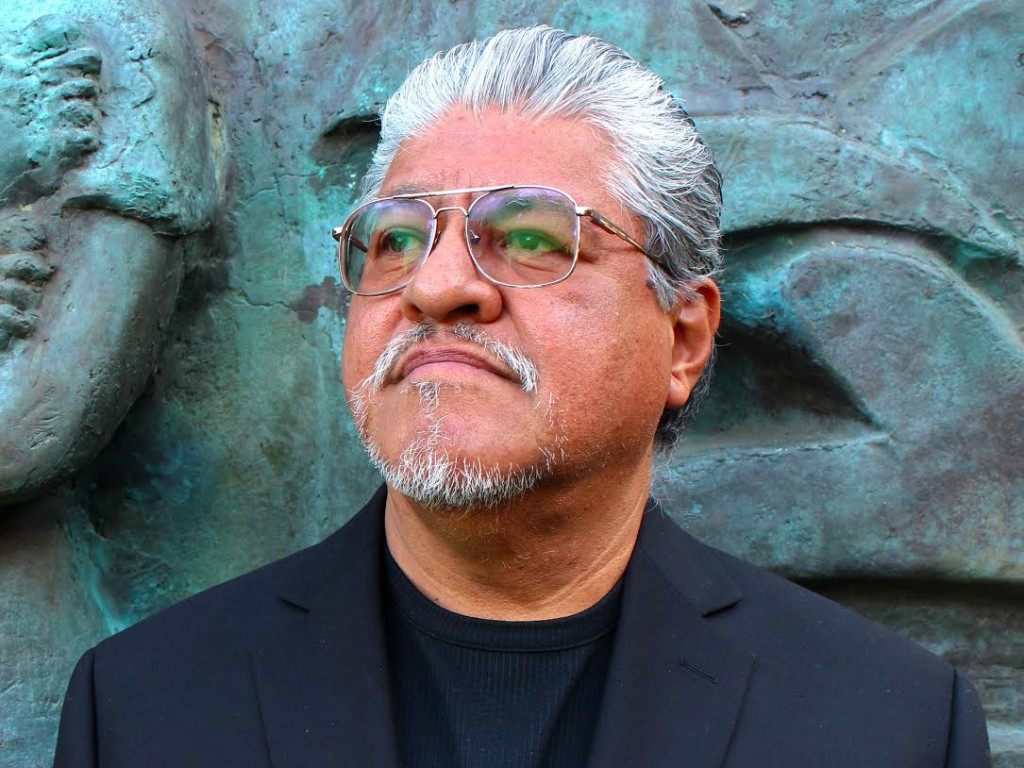Growing up in poverty in South Central and East Los Angeles, Luis J. Rodriguez says he found himself so emotionally empty that he joined a gang at age 11. He started abusing heroin by 12, and by 15, he was put in juvenile hall and later prison. It was his love for books, however, which turned his life around.
At 60, Rodriguez is now an award-winning poet, author, and founder of a cultural arts center which helps youth in the San Fernando Valley stay away from gangs. This month, he was chosen by Los Angeles Mayor Eric Garcetti to be the city’s second Poet Laureate, succeeding Eloise Klein Healy.
“I thought they’re probably not going to pick me,” says Rodriguez, who was one of approximately 30 applicants. “I was quite amazed. I also understand the responsibility. I want kids to recite poetry. I’ll do anything to get poetry exploding in Los Angeles.”
Rodriguez will be getting an office in the same Central Library where he had once found refuge from the gang world four decades ago. The same peaceful place where he’d escape gunshots, and spend hours upon hours reading, will now be where he writes poems for his city.
“In the end books saved my life,” says the man who has written 15 of his own, including his most recent memoir, “It Calls You Back: An Odyssey Through Love, Addiction, Revolutions, and Healing,” a finalist for the National Book Critics Circle Award.
Rodriguez remembers before he was aware of the power of books, the most eminent force in his life were the gang members who surrounded him.
“They were tough. Everyone was scared of them. They had heavy tattoos,” recalls Rodriguez. “I wanted to be part of that. I thought being a part of that, people would respect me.”
However, in the late 60’s and early 70’s, he says soldiers began returning from the Vietnam War wounded mentally, and there was heroin everywhere. That’s when he says what he thought about gangs began to erode.
“You used to be able to trust your homies, but I realized you couldn’t trust an addict,” says Rodriguez. “I was becoming just like them. When guns come in to the picture, people start killing people. It wasn’t this homey and loving relationship. It wasn’t a place where people could relate and hang. By the time I was 19, I had lost 25 friends, I was addicted to heroin, my family threw me out.”
Rodriguez spent time in county jail for some misdemeanors, where he started writing little stories, but once he was out, he decided he wasn’t going to go back. He opted to return to school instead and even went to night school to better his English.
“I started doing gang intervention,” he says. “I tried helping my neighborhood, and I actually got shot at by one of the gang members because of my work.”
However, Rodriguez remained steadfast, after equipping himself with the power of books. He went on a 35-year mission of gang intervention around the world, which he still makes time for, and founded Tia Chucha’s Centro Cultural and Bookstore, with his wife, in 2001.
“This has helped a lot of kids,” says Rodriguez. “Gang kids show up, and they’re welcome. They are young people that need a relationship to options. The option can’t be, ‘I’m going to prison,’ or ‘I’m going to be a heroin addict.’ They need to know they have gifts and callings. That’s what they need to tap into. That’s the work that I do – tap into their own capacities – build them up from there, so they don’t feel like they’re trapped in their crazy life.”
On November 1, Rodriguez will be one of the award-winning authors to speak at the 15th Annual Los Angeles Latino Book & Family Festival – along with three other poets from Tia Chucha. He says it’s very important for him to give back to his community, because it was the same community which helped get him back on his feet.
What is the one piece of advice he would give his younger self with the wisdom he now has?
“The one thing I had was my imagination,” says Rodriguez. “All young people are filled with imagination, but with all the trauma of life and on the streets you lose it. You’re stuck trapped. Don’t lose your imagination.”
